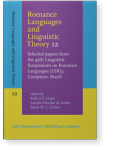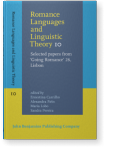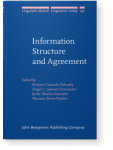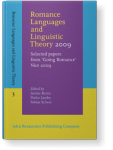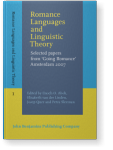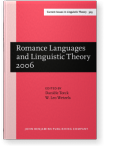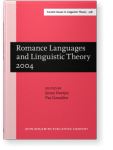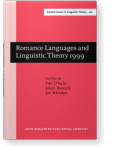Gabriela Matos
List of John Benjamins publications for which Gabriela Matos plays a role.
2017 Chapter 10. TP ellipsis with polarity particles Romance Languages and Linguistic Theory 12: Selected papers from the 45th Linguistic Symposium on Romance Languages (LSRL), Campinas, Brazil, Lopes, Ruth E.V., Juanito Ornelas de Avelar and Sonia M. L. Cyrino (eds.), pp. 141–158 | Chapter
TP-ellipsis with polarity particles exhibits island effects not only in cases of long-distance movement of the remnant but also when the remnant does not cross any island, showing that some non-overt element moves from the elided TP. Also in non-island contexts, TP-ellipsis with non-local… read more
2016 Explicative clauses in Portuguese as a case of parentheses Romance Languages and Linguistic Theory 10: Selected papers from 'Going Romance' 28, Lisbon, Carrilho, Ernestina, Alexandra Fiéis, Maria Lobo and Sandra Pereira (eds.), pp. 43–60 | Article
A subset of causal explicative clauses in European Portuguese (EP) introduced by the connectors pois ‘for’, que ‘that’ and porque ‘because’ has been classified either as coordinate or subordinate clauses, or alternatively as autonomous discursive expressions. Extending previous work, we claim that,… read more
2013 The alternation between improper indirect questions and DPs containing a restrictive relative Information Structure and Agreement, Camacho-Taboada, Victoria, Ángel L. Jiménez-Fernández, Javier Martín-González and Mariano Reyes-Tejedor (eds.), pp. 83–116 | Article
This paper analyses the alternation between improper indirect questions and DPs containing a restrictive relative in European Portuguese. We propose that this alternation is lexically restricted, only occurring with weakly assertive cognitive definite predicates, in the sense of Hinzen and Sheehan… read more
2011 Floating parenthetical coordinate clauses Romance Languages and Linguistic Theory 2009: Selected papers from 'Going Romance' Nice 2009, Berns, Janine, Haike Jacobs and Tobias Scheer (eds.), pp. 203–222 | Article
Floating parenthetical coordinate clauses exhibit a challenging behaviour: they disrupt the structure of the host sentence, do not present an overt first term, occur in different positions inside the host clause and, although notionally related to their host, they present syntactic autonomy. Taking… read more
2009 Ellipsis and Restructuring in European Portuguese Romance Languages and Linguistic Theory: Selected papers from ‘Going Romance’ Amsterdam 2007, Aboh, Enoch O., Elisabeth van der Linden, Josep Quer and Petra Sleeman (eds.), pp. 109–130 | Article
In this paper we propose that, in European Portuguese, the complementary distribution between Null Complement Anaphora (NCA) and Restructuring (also noted by Brucart 1999 and Depiante 2001, for Spanish and Italian) results from the selectional properties of the verbs that accept these… read more
2009 Appositive sentences and the structure(s) of coordination Romance Languages and Linguistic Theory 2006: Selected papers from ‘Going Romance’, Amsterdam, 7–9 December 2006, Torck, Danièle and W. Leo Wetzels (eds.), pp. 159–174 | Article
Coordination is not a unitary phenomenon: as far as binding and scope of external
elements are concerned, appositive coordinate sentences may differ from their nonappositive
integrated counterparts in the same way as appositive relatives differ
from restrictive relatives, suggesting that different… read more
2006 Null Complement Anaphora in Romance: Deep Or Surface Anaphora? Romance Languages and Linguistic Theory 2004: Selected papers from ‘Going Romance’, Leiden, 9–11 December 2004, Doetjes, Jenny and Paz González (eds.), pp. 95–120 | Article
2001 Negative concord and the minimalist approach Romance Languages and Linguistic Theory 1999: Selected papers from ‘Going Romance’ 1999, Leiden, 9–11 December 1999, D’hulst, Yves, Johan Rooryck and Jan Schroten (eds.), pp. 245–280 | Article
